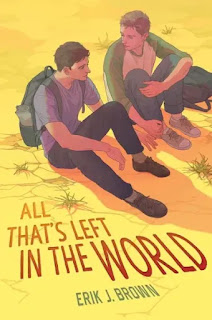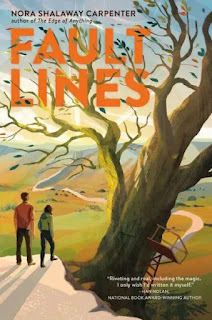Wednesday, January 31, 2024
Check & Mate, by Ali Hazelwood
Saturday, January 27, 2024
Briar Girls, by Rebecca Kim Wells
Miranda promises that she can help Lena break the curse in exchange for Lena's help in helping bring down an evil tyrant who holds sway over the city of Gather deep within the Silence -- a feat which requires killing or setting free a sleeping princess protected within a castle surrounded by impenetrable briars. But it quickly becomes apparent that Miranda is not telling the truth and, as various adventures unfold, she's far from unique. Just about everyone in this story has hidden agendas and is hiding something. Lena has to figure out who to trust and often must take temporary advantage from unreliable allies.
Featuring dragons, wolves, blood magic, curses, prophecy, and the rather enigmatic Silence itself, Briar Girls is a densely written, fast-paced fantasy adventure. It sacrifices a great deal of character development in the process. For while we get a chance in the beginning to meet Lena and to develop her rebellious and largely disobedient personality, most of the other characters are underdeveloped. A sexual encounter between Lena and a boy named Alaric is sweet but strangely clinical. A professed love with Miranda goes largely unconsummated, but does feature some brief moments of jealousy that suggest at feelings that are never quite allowed to develop. As far as side characters, most of all I enjoyed the dragons, who were delightfully sadistic (as well as being snobby epicureans). A story like this lives and dies on the action and the world building, both of which are stellar so any flaws in the characters can be overlooked safely.
Thursday, January 25, 2024
All That's Left in the World, by Erik J. Brown
But before any sort of romance can develop, the two boys are forced to flee when more hostile invaders arrive on the scene. The two of them set out roughly following Andrew's original plan, heading south to the remains of Washington DC. And when things don't work out, they then go down to Florida, encountering both friend and foe. Along the way, they find vivid examples of how different choices have fared for the varied survivors.
While the writing is decent and the characters well-developed, the author really struggled to come up with a story. The bulk of the novel is just a series of encounters with strangers stringed together. Some go well and some go poorly, but they don't add up to a story and do get very repetitive. The overall goal of the trip, which might have formed a true plot, keeps shifting. It feels like Brown just fell in love with the idea of a post-apocalyptic survival story between two (maybe) gay boys. However, even the romance is not really consummated and notably lacking in any heat.
In the author's notes at the end, Brown attests that the story's similarities to recent events is largely coincidental. It was originally drafted in 2015 (and thus predates COVID) but it's hard not to draw parallels.
Saturday, January 20, 2024
Love & Resistance, by Kara H. L. Chen
None of this plays out realistically, but it's a whole lot of fun and all in service to a good cause: addressing bullying and racism. At first, Olivia and her friends are all focused on getting revenge and striking back, but as those strategies largely fail, they make the important realization that the best way to confront power is to render it irrelevant. A society based on fear and conformity can't survive when its values are ignored. Chen never draws the analogy out to anything greater than Olivia's school, but the novel's epilogue all but connects the dots to a challenge to our larger society.
The character building seemed weak to me and the love stories lacked much fizz, but I enjoyed the story --in the beginning because it was fun and then in the end because it had a lot of useful advice for young people who find themselves too wrapped up in social media and trying to please everyone around them.
Sunday, January 14, 2024
Fault Lines, by Nora Shalaway Carpenter
Dex and his mother have recently moved to the area so Mom can work on the pipelines. Drowning in medical bills, this is the first real job that she's had in years. So while Dex isn't entirely unfamiliar with the environmental damage that fracking causes, his family has different priorities. In any case, what happens here is of little concern to him. He's signing up for the Army. His mother doesn't approve, but he knows that serving will get him out of his mom's hair, give him an income, and send him to college.
The two of them, in sum, should have no reason to connect. Viv hates what Dex's mom does for a living. Dex, with his eyes set on the Army, has already checked out. But as two outsiders, they become attracted to each other and eventually form an alliance to stand up for themselves and their beliefs.
Despite the attention paid to the environmental devastation being caused in West Virginia (and the author's loving depictions of the natural beauty of Appalachia), this is not solely a screed for environmentalism. Rather, it is a tale of two young people emerging from their shells. Viv and Dex both come from families dealing with loss (Viv's mother is dead and Dex's father is a struggling alcoholic whom was kicked out of the house). As a result, their single-parent households fail to provide much of a role model for moving forward. That they each do so is ultimately quite satisfying.
Thursday, January 11, 2024
Every Bird a Prince, by Jenn Reese
Seeming unrelated, things start to change for her when she rescues a bird in the woods. He's a prince and he wants to reward her for her bravery and kindness by making Eren his champion. What does a bird's champion do? They fight "frost fangs" -- wolf-like creatures that feed on people's insecurities.
It turns out that these frost fangs have been waging a war and the birds have been the sole defense, but their strength is diminishing. If no one does anything, the frost fangs will take over and humanity will be lost to its insecurities. This being a middle reader, everything will fall on Erne, Alex, and a few of their friends to save the world (or at least their school). The showdown takes place at the school dance, where Eren must first overcome her own fears and anxieties and then convince her peers to do likewise.
I found it a clever fantasy novel with some heavy-handed messages about building up self-confidence and learning to turn off voices of doubt in your head. There's some messy stuff about whether Erne is "aromantic" or simply not ready for romantic relationships -- given her age, in my opinion, the difference is unimportant and distracting. The far stronger message is that everyone has doubts about themselves, but it is important to not let them paralyze you from living your life and standing up for what you believe in. It's not a new message, but the packaging here is quite clever and the story is memorable.
Sunday, January 07, 2024
Hot Dutch Daydream, by Kristy Boyce
Sage has landed herself an ultra prestigious internship with Dr. Reese, a leading oncologist, at her research laboratory in Amsterdam. She'll have to take care of the doctor's three-year-old son during the day and do a lot of drudge work, but in exchange, she'll get to attend a conference in Berlin and make a lot of connections. There's just one catch: she must stay away from Dr. Reese's gorgeous eighteen year-old son, Ryland. You already know how this is going to turn out....
Ryland and Sage spend the summer going from hatred to reluctant coworkers to secret lovers (although the relationship doesn't move much further along than furtive kissing). Along the way, they visit all of the sites, including two of my favorites: the Zoo and the Kattenkabinet (Amsterdam's museum of feline art). There's tastings of all the local culinary favorites and even a (slightly ridiculous) drop in at a coffee shop.
On the whole, there was nothing particularly objectionable about the book, but it felt like a pale imitation of its predecessor. Sage is not nearly as interesting as Emmie from that book, lacking the compelling backstory which made rooting for Emmie more rewarding. Sage, in contrast, is a grind with a serious work-life imbalance. If you haven't read Hot British Boyfriend, start there and then pick this one up afterwards and see if you agree that we might have been better off with a one-and-done.








